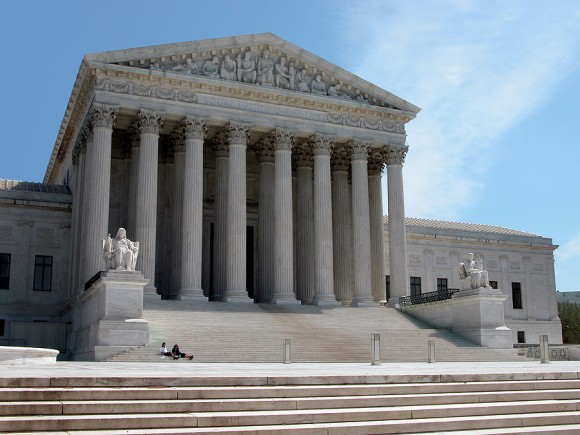The U.S. Supreme Court will consider whether federal law bars employers from discriminating on the basis of sexual orientation and gender identity, accepting cases that could let the court’s new conservative majority put its imprint on the American workplace.
The justices will hear an appeal from Gerald Lynn Bostock, who says a Georgia county fired him because he’s gay. In a separate case, the court will consider whether a Michigan funeral-home chain was within its rights to fire transgender worker Aimee Stephens as she was preparing to start living openly as a woman. The court will take up the cases in the nine-month term that starts in October.
Courts around the country are divided about the scope of the main U.S. job-bias law, known as Title VII. Some federal appeals courts in recent years have said sexual-orientation and gender-identity discrimination are forms of prohibited gender bias under the law.
The cases could affect thousands of public and private workplaces and determine the rights of millions of gay, lesbian, bisexual and transgender employees.
The disputes are likely to closely divide the court. They could highlight the impact of Justice Brett Kavanaugh’s confirmation in October to succeed Justice Anthony Kennedy, who usually backed gay rights.
Title VII, part of the 1964 Civil Rights Act, outlaws job discrimination on the basis of “sex,” as well as race and other factors, but doesn’t explicitly mention sexual orientation or gender identity.
Bostock, who worked as child-welfare services coordinator for Georgia’s Clayton County, was fired in 2013 after becoming involved with a gay recreational softball league. The county says his sexual orientation wasn’t a factor in his dismissal, pointing to an internal audit of the funds he managed.
Bostock says sexual-orientation discrimination is often indistinguishable from gender stereotyping. The Supreme Court ruled in 1989 that the law prohibits gender stereotyping.
Title VII has become a “robust source of protection” from workplace discrimination “regardless of any hypertechnical distinctions as to how sex becomes a factor in an employer’s decision,” he argued in his appeal.
Clayton County said that interpretation can’t be squared with the words of the law. Bostock’s appeal is “a thinly veiled invitation for the court to re-write Title VII to add a protected class that Congress did not include and did not intend to include,” the county argued.
The county, located south of Atlanta, is likely to have the support of the Trump administration, which said in a 2017 court filing that federal law doesn’t prohibit sexual-orientation discrimination.
That stance marked a shift for the federal government. Two years earlier, when Barack Obama was president, the Equal Employment Opportunity Commission said sexual orientation discrimination is covered because “it necessarily entails treating an employee less favorably because of the employee’s sex.”
In the gender-identity case, R.G. and G.R. Harris Funeral Homes Inc. and owner Thomas Rost fired Stephens from a position as a funeral director two weeks after she disclosed plans to return from a 2013 vacation as a woman. The company says Stephens, who had worked there as a man for six years, would have been in violation of its dress code, which requires men to wear a suit and women to wear a skirt and suit jacket.
Rost “reasonably determined that the employee’s actions would violate the company’s sex-specific dress code and disrupt the healing process of grieving families,” the appeal argued. Rost also says he has a religious objection to letting Stephens present herself as a woman at work, though that issue won’t be before the high court.
In siding with Stephens, a federal appeals court said the funeral home had engaged in sex stereotyping — a finding she says didn’t break any new ground.
Federal appeals courts “are uniform in recognizing that everyone who experiences discrimination motivated by sex stereotypes related to appearance and behavior may assert a claim of sex discrimination, including transgender people,” Stephens argued to the Supreme Court.
The appeals court also reached a more sweeping conclusion, saying that firing someone based on transgender status constitutes sex discrimination under Title VII.
Although the EEOC originally brought the case against the funeral home, the Trump administration now says the appeals court was wrong. Title VII “does not apply to discrimination against an individual based on his or her gender identity,” U.S. Solicitor General Noel Francisco argued.
The cases are Bostock v. Clayton County, 17-1618, and R.G. and G.R. Harris Funeral Homes v. Equal Employment Opportunity Commission, 18-107.
Related:
- Supreme Court Won’t Hear Sexual Orientation Job Bias Case
- Trump Administration Argues U.S. Civil Rights Law Does Not Protect Gay Employees
- Court Rules Gay Employees Not Protected Under Civil Rights Law
- Marriage Right Doesn’t Protect Gays in Employment, Commerce or Housing
- EEOC Suits Against Employers Allege Transgender Bias
- Beyond Wedding Cakes: LGBT Lawsuits Challenge Employee, Business, Religious Rights
Was this article valuable?
Here are more articles you may enjoy.



 Experian Launches Insurance Marketplace App on ChatGPT
Experian Launches Insurance Marketplace App on ChatGPT  Judge Tosses Buffalo Wild Wings Lawsuit That Has ‘No Meat on Its Bones’
Judge Tosses Buffalo Wild Wings Lawsuit That Has ‘No Meat on Its Bones’  Munich Re Unit to Cut 1,000 Positions as AI Takes Over Jobs
Munich Re Unit to Cut 1,000 Positions as AI Takes Over Jobs  Insurify Starts App With ChatGPT to Allow Consumers to Shop for Insurance
Insurify Starts App With ChatGPT to Allow Consumers to Shop for Insurance 

